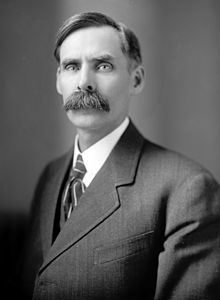
Andrew Volstead

Andrew Volstead | |
|---|---|
 | |
| Member of the U.S. House of Representatives from Minnesota's 7th district | |
| In office March 4, 1903 – March 3, 1923 | |
| Preceded by | Frank Eddy |
| Succeeded by | Ole J. Kvale |
| Personal details | |
| Born | Andrew John Volstead October 31, 1859 Kenyon, Minnesota, U.S. |
| Died | January 20, 1947 (aged 87) Granite Falls, Minnesota, U.S. |
| Resting place | Granite Falls Cemetery |
| Political party | Republican |
| Profession | Law |
Andrew John Volstead (/ˈvɒlstɛd/) (October 31, 1859 – January 20, 1947) was an American member of the United States House of Representatives from Minnesota, 1903–1923, and a member of the Republican Party. His name is closely associated with the National Prohibition Act of 1919, usually called the Volstead Act. The act was the enabling legislation for the enforcement of Prohibition in the United States beginning in 1920.

Early life
Volstead was born in Kenyon, Goodhue County, Minnesota, to Norwegian-American parents Jon Einertson Vraalstad (John Vrolstad), a distant relative of Queen Sonja of Norway,[citation needed] and wife Dorothea Mathea Lillo. He was educated at St. Olaf College, became a lawyer and served as mayor of Granite Falls, Minnesota, from 1900 to 1902. According to his obituary in a 1947 edition of the Minneapolis Star, he first practiced law in Grantsburg, Wisconsin, before moving to Granite Falls in 1886.

Congressional career
While in Congress, he served as chairman of the House Judiciary Committee from 1919 to 1923. Although often considered the author of the Volstead Act, he collaborated with Wayne Wheeler of the Anti-Saloon League, who conceived and largely drafted the bill. However, Volstead sponsored the bill and championed, promoted and facilitated its passage.[1] He also helped author the Capper–Volstead Act, which enabled farmers to form locally owned cooperatives without fear of prosecution under the Sherman Antitrust Act. The law is still in effect.

Volstead was a member of the 58th, 59th, 60th, 61st, 62nd, 63rd, 64th, 65th, 66th, and 67th congresses. He was defeated in his attempt to be elected to an 11th term in 1922. Shortly thereafter he was hired as legal adviser to the chief of the National Prohibition Enforcement Bureau.

Upon repeal of Prohibition in 1933, Volstead returned to Granite Falls, Minnesota, where he resumed the private practice of law.

He died in 1947. Volstead's former home, located at 163 Ninth Avenue, Granite Falls, Minnesota, is a National Historic Landmark. He is buried in the Granite Falls city cemetery.[2]

See also
- List of covers of Time magazine (1920s) – March 29, 1926
- Bootleggers and Baptists
Notes
- United States Congress. "Andrew Volstead (id: V000114)". Biographical Directory of the United States Congress.
References
- ^ "The 18th Amendment". University at Albany, SUNY. Archived from the original on October 11, 2014. Retrieved October 20, 2014.
- ^
 This article incorporates public domain material from Volstead, Andrew John, (1860–1947). Biographical Directory of the United States Congress.
This article incorporates public domain material from Volstead, Andrew John, (1860–1947). Biographical Directory of the United States Congress.
External links
- 1860 births
- 1947 deaths
- American people of Norwegian descent
- American temperance activists
- American cooperative organizers
- Mayors of places in Minnesota
- Prohibition in the United States
- Republican Party members of the United States House of Representatives from Minnesota
- St. Olaf College alumni
- People from Kenyon, Minnesota
- People from Granite Falls, Minnesota
See what we do next...
OR
By submitting your email or phone number, you're giving mschf permission to send you email and/or recurring marketing texts. Data rates may apply. Text stop to cancel, help for help.
Success: You're subscribed now !

